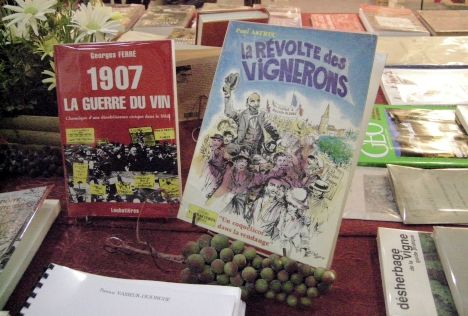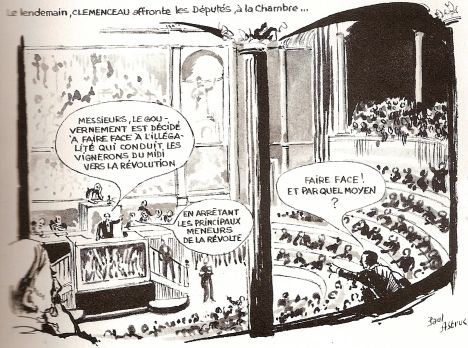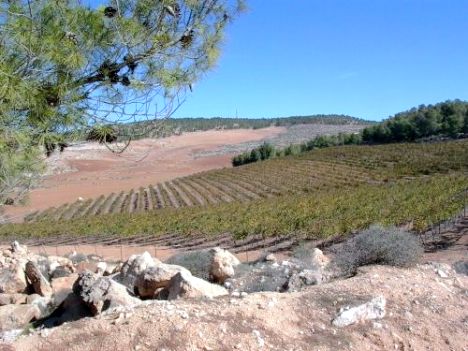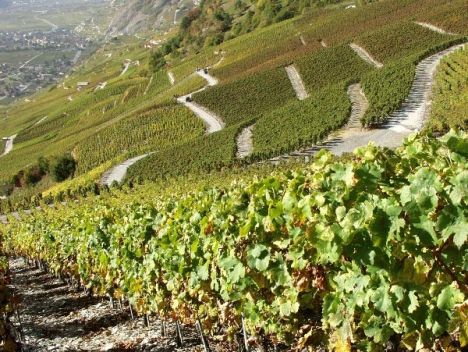In the wine discussion about the best or the worst drop, something never comes up, so to speak: politics. It seems as if everybody - traders, producers or consumers - give the topic a wide berth. Politics has nothing to do with wine! Or maybe it does? It is history that proves us wrong. Last year, the Languedoc commemorated the "Révolte des Vignerons" one hundred years ago.
 |
| Publications on the state of winegrowers in the Languedoc in 1907 |
The facts: In the years after 1904, wine from Languedoc/Roussillon, the largest wine region in France, can hardly be sold. The government speaks of overproduction, but the winegrowers blame taxes and imports. In February, a tax strike is called in the heart of the Languedoc (Aude). An uprising begins. From April to June, thousands of winegrowers gathered every Sunday in a different town in the Languedoc. At the last demonstration in Montpellier, 800,000 people were already protesting, but the government had no ear for their concerns. Georges Clémenceau, then president of the parliament, deploys troops. As a result: street battles in villages and towns, in which 6 people die, including a girl of 15.
 |
| Clémenceau sends troops to the south to put down the uprising (publication "la Révolte des Vignerons"% 1984) |
This was the sad culmination of a harsh confrontation. The government withdrew the troops, the arrested leaders received amnesty, the parliament banned the production of artisanal and sugar wines. The new law later led to the designation of AOC wines (Appellation d'origine controlée), which still today is supposed to guarantee the quality and origin of French wines.
Why am I telling all this, since it is one hundred and one years ago? But - aren't the processes very well known to us, from recent history? Sunday demonstrations, the inability of the governments to listen to the concerns of the citizens, to react to them, the demand of the vintners, overproduction, import, artificial wine, decay of the prices, high taxes....
One thing or another is certainly interpreted differently today, seen differently and valued differently in a capitalist or free market economic system. Damage to property, destruction and violence are branded as illegal means of protest. But, hand on heart, is everything so very different?
 |
| Struggle of the winegrowers in Languedoc in 2007: An attack causing 3 million euros of damage |
Politics has as much to do with wine production today as it once did over a hundred years ago: Tax policy, environmental policy, labour and social policy, trade policy I ask myself: why is it that people are not allowed or do not want to talk or write about it? For example, about the EU's drive to get rid of the European overproduction. At the same time, however, new markets - promoted by the EU - are entering the wine business, while at the same time regulations are being relaxed and simplifying production methods are being legalised.
An outcry is now going around. I know: it is not that simple! No, it is not that simple, but it is so political, infinitely political. That is where my serious doubts begin, my reservations. Why can't we talk about it? Why?
 |
| Wines from the Golan Heights of Galilee and the Negev Desert |
Recently a wine lover in the forum expressed the view: "I find wines from Israel politically and ecologically problematic. For example, Israel has been drilling for primeval, non-regenerative deep reservoirs that lie under what is actually Palestinian territory for years. This water is not distributed according to a key that fairly takes into account the proportion of the Palestinian population, but preferentially to what the UN sees as Zionist illegal settlers." Wow - that was too strong stuff! I suspected it - the reaction was accordingly fierce, not argumentative, no, it was delivered with "stones" or with clubs.
Regardless of whether the political conclusion formulated is right, timely, effective or even clever: It is allowed to make the connection between wine and politics in a wine discussion. It is also allowed to ask for the political context of "darlings". Or is this only allowed in the case of China on the occasion of the Olympics, while before and after many of the protesters maintain the best "business relations" with the same country ("made in China"). Or was this only allowed with communist ruled countries during the years of the "cold war"? Only permissible, even virtuous, in relation to South Africa during the apartheid era?
 |
| Almost a political scandal: on the 60th birthday of the federal state of Rhineland-Palatinate, wine from Hesse was served |
The question of a political context is not only permissible, but very often necessary. They don't always have to be highly dramatic questions of principle. They can also concern regulations, social welfare, the environment, labour law, etc. Politics also has an influence on pricing that should not be underestimated: be it through taxes, customs duties or declaration regulations.
Politics is also made indirectly: through associations, trade agreements, major distributors, environmentalists No, wine is definitely also a political issue. And because this is so, the wine consumer should not only enjoy it, but also learn to think politically. To stay on our own doorstep: it is only politically understandable that Valais, the largest wine-producing canton in Switzerland (approx. 40%), has left the Swiss winegrowers' association for local political reasons and self-interest, thus paralysing the rest of wine Switzerland in terms of advertising, uniform regulation and common policy.
 |
| Largest wine-growing region in Switzerland% the Valais |
In the meantime, the hated new AOC regulation has already been changed in parliament in favour of the wine-strong Valais. Maybe we wine consumers, wine lovers, wine phantasts have to think and argue more politically from time to time. Then we might be able to understand one or the other better. Because politics and wine, that's not only allowed, it also has to be!
Cordially
Yours sincerely
Peter (Züllig)